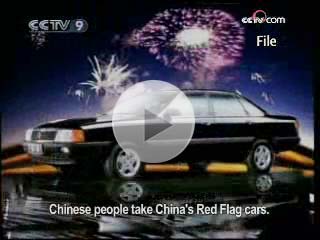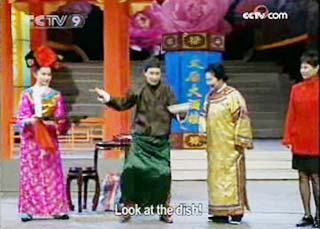------Program code: DO-090115-01527 (what's this?)
Source: CCTV.com
01-15-2009 08:57
 |
February 19 was the day on which Spring Festival fell in 1996. It was New Year’s Day by the lunar calendar, the day of the year of Bingzi. On the previous evening CCTV had presented a live broadcast of its Spring Festival Gala from Beijing, Shanghai and Xi’an.
 |
Fifteen scientists and engineers played violins in concert with a high-tech laser harp, in a performance called “A Rich Display of Light and Colour”. Each time Zhou Xiaoyan and Cheng Bushi used their hands to cut off a laser beam on the harp, they were effectively plucking a string.
Also at the Gala, Zhao Lirong and Gong Hanlin performed the skit “A Migrant Worker’s Adventure”. It poked fun at hotels that charged high prices for poor service. After the show, Zhao Lirong’s lines became catchwords.
On the first day of the Spring Festival holiday, CCTV’s “Network News” reported on the Chinese people overseas and their celebrations. Since 1979, more than half a million people from China’s mainland had studied in or emigrated to other countries.
At the end of February, 46-year-old Gary Locke was campaigning to become Governor of Washington State. If successful, he would become the first governor of Chinese descendent in American history.
Locke won the election, and shortly afterwards he took a delegation consisting of 22 officials from Washington State on a visit to China. He and his family made a special journey to pay their respects to his ancestors in Jilong Village, Taishan, Guangdong Province. Over a century before, his grandfather had left his home to make a living in the United States. The governor’s office was only a mile from the house where Locke’s grandfather had lived in the U.S.. When he talked about his election, he said he had spent a hundred years covering a distance of just one mile.
Every day during the Spring Festival holiday, more than 130,000 people passed through Luohu Customs, as Hong Kong residents flocked to the mainland to visit their relatives. Meanwhile, the mainland residents were starting to change the tradition of spending the festival at home. In Beijing, the China Comfort Travel Company chartered a plane for tourists to go abroad for the first time.
Prior to the Spring Festival, a traffic restriction had been enforced in Beijing, by which vehicles, depending on whether their number plates ended in an odd or even digit, could use the roads within the third ring-road between 7 a.m. and 8 p.m. on alternate days. Private cars accounted for 140,000 of the nearly one million vehicles on the city’s roads. A survey conducted by the State Statistics Bureau showed that 70 percent of residents in China’s large and medium-sized cities intended to buy a car.
In February, the State Education Commission and the Ministry of Finance initiated the Compulsory Education Programme in Impoverished Areas. Under the programme, the central government and local governments at all levels would allocate 20 billion yuan for providing compulsory education in impoverished areas between 1995 and 2000. It was envisaged that compulsory education would become universal across the country in the early 21st century.
A month later, China Youth Daily carried an item under the headline, “Going to School with Dad on His Back”. It featured Li Yong, a 16-year-old from rural Ningxian County, Gansu Province. Every day when he went to school, he would carry his paralysed father on his back to somewhere nearby, where he could keep an eye on him. After classes, Li Yong would do odd jobs to support his family.
In Beijing, screenwriter Wang Zhebin read the story and wrote the following words in an essay: “I like the words ‘carry on his back’. What kind of power stimulated a 16-year-old boy to sell his family’s property and carry his father on his back when he went to the city to attend school? What could be his bearable heaviness of being? I had a series of questions in my mind.” Three months later, Wang Zhebin visited Li Yong’s home town. She wrote about what she saw there: “For the first time, when I came to the primary school where Li Yong had been a pupil, I saw children in the playground, bent over. Each of them was writing characters, using the ground as their paper and the branch of a tree as their pen. I asked them why they didn’t write in the classroom. One of the children said that after they had practised on the ground, they wouldn’t write any wrong characters in their exercise-books, which meant their families wouldn’t have to buy erasers. The teacher showed me their exercise-books, with the characters written so neatly that I could use them as models of calligraphy for my son, and I couldn’t help shedding tears.”
